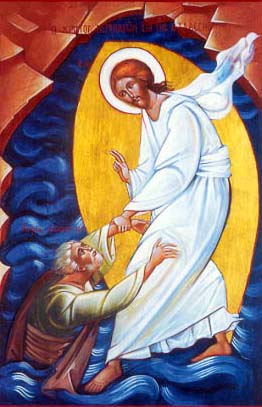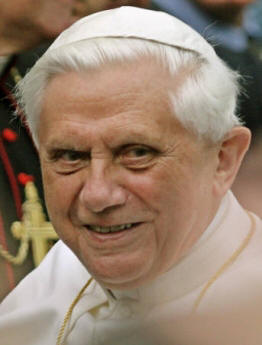| The Precepts of the Church | |
|
Whence has the Catholic Church the right to make laws? The Catholic Church has the right to make laws from Jesus Christ, who said to the apostles, the first bishops of His Church: "Whatever you bind on earth shall be bound also in heaven." Amen I say to you, whatever you bind on earth shall be bound also in heaven; and whatever you loose on earth shall be loosed also in heaven. (Matthew 18:18) By whom is this right to make laws exercised? This right to make laws in exercised by the bishops, the successors of the apostles, and especially by the Pope, who as the successor of the chief of the apostles, Saint Peter, has the right to make laws for the Universal Church. And I say to thee, thou art Peter, and upon this rock I will build my Church, and the gates of hell shall not prevail against it. (Matthew 16:18) which are the chief commandments, or laws of the Church? The chief commandments, or laws, of the Church are these six:
What sin does a Catholic commit who through his own fault misses Mass on a Sunday or holyday of obligation? A Catholic who through his own fault misses Mass on a Sunday or holyday of obligation commits a mortal sin. Keep you my Sabbath; for it is holy unto you. (Exodus 31:14) Which are the holydays of obligation in the United States? The holydays of obligation in the United States are these six:
Note: Christmas is always a holy day of obligation on whatever day it falls. When the feasts of the Assumption, All Saints or the Solemnity of Mary, Mother of God (Jan. 1) are celebrated on a Saturday or Monday, there is no obligation to participate in Mass. The Immaculate Conception remains a holy day of obligation except when December 8 falls on Sunday. Then the feast is transferred to Monday, in which case it is not considered a holy day. However, the faithful are still encouraged to participate at Mass on these days. What else does the Church oblige us to do on holydays of obligation? The Church obliges us to abstain from servile work on holydays of obligation, just as on Sundays, as far as we are able. Why were holydays instituted by the Church? Holydays were instituted by the Church to remind us of the mysteries of our religion and of the important events in the lives of Christ and of His Blessed Mother, and to recall to us the virtues and the rewards of the saints. Then Jesus was led into the desert by the Spirit to be tempted by the Devil. After fasting for forty days and forty nights he at last became hungry (Mt 4:1-2) What is a fast day? A fast day is a day in which only one full meal is taken; the other two meals together should not equal a full meal. In the United States the only fast days are Ash Wednesday and Good Friday. Eating between meals is not permitted, but liquids, including milk and fruit juices, are allowed. Who are obliged to observe the fast days of the Church? All baptized persons between the ages of eighteen and fifty-nine are obliged to observe the fast days of the Church, unless excused or dispensed. Who are obliged to observe the abstinence days of the Church? All Catholics who have passed their fourteenth birthday and have attained the use of reason are obliged to observe the abstinence days of the Church, unless excused or dispensed. Why does the Church command us to fast and to abstain? The Church commands us to fast and to abstain in order that we may control the desires of the flesh, raise our minds more freely to God and make satisfaction for sin. But thou, when thou dost fast, anoint thy head wash thy face, so that thou mayest not be seen fasting by men, but by thy Father, who is in secret; and thy Father, who sees in secret, will reward thee. (Matthew 6:18)\ Why does the Church make Fridays of Lent days of abstinence? The Church makes Fridays of Lent days of abstinence in order that we may do penance for our sins, and also in order that we may prepare ourselves more worthily for Good Friday, when we commemorate the death of Jesus Christ. How can we know the days appointed for fast or abstinence? We can know the days appointed for fast or abstinence from the instructions of our bishops and priests. What is meant by the commandment to confess our sins at least once a year? By the commandment to confess our sins at least once a year is meant that we are strictly obliged to make a good confession within the year, if we have a mortal sin to confess. Confess, therefore, your sins to one another. (James 5:16) Why should we go to confession frequently? We should go to confession frequently because frequent confession greatly helps us to overcome temptation, to keep in the state of grace, and to grow in virtue. What sin does a Catholic commit who neglects to receive Holy Communion worthily during the Easter time? A Catholic who neglects to receive Holy Communion worthily during the Easter time commits a mortal sin. He who eats my flesh and drinks my blood has life everlasting and I will raise him up on the last day. For my flesh is food indeed, and my blood is drink indeed. (John 6:55-66) What is the Easter time in the United States? The Easter time in the United States begins at the Vigil of Easter Sunday and ends on Pentecost Sunday (50 days after Easter Sunday) What is meant by the commandment to contribute to the support of the Church? By the commandment to contribute to the support of the Church is meant that each of us is obliged to bear his fair share of the financial burden of the Holy See, of the diocese, and of the parish. So also the Lord directed that those who preach the gospel should have their living from the gospel. (1Corinthians 9:14) What is the ordinary law of the Church to be observed at the wedding of a Catholic? The ordinary law of the Church to be observed at the wedding of a Catholic is this: A Catholic can contract a true marriage only in the presence of an authorized priest and two witnesses. Does the Church forbid Catholics to contract marriage with certain persons? The Church does forbid Catholics to contract marriage with certain persons, and the following are examples: first, a marriage with a non-Catholic; this is a mixed marriage; second, a marriage with a second cousin, or any relative closer than a second cousin. Why does the Church forbid Catholics to marry non-Catholics? The Church forbids Catholics to marry non-Catholics because mixed marriages often bring about family discord, loss of faith on the part of the Catholic, and neglect of the religious training of the children. And it is better to die without children, than to leave ungodly children. (Ecclesiasticus 16:4) Does the Church ever permit mixed marriages or marriages between close relatives? For grave reasons the Church sometimes permits mixed marriages or marriages between close relatives; such a permission is called a dispensation. Does the Church allow Catholics to marry during Lent and Advent? The Church allows Catholics to marry during Lent and Advent, thought hey should do so without much festivity. A Nuptial Mass is now allowed during these seasons. What is a Nuptial Mass? A Nuptial Mass is a Mass which has special prayers to beg God's blessing on the married couple. |
Saint Peter
Pope Benedict XVI |

